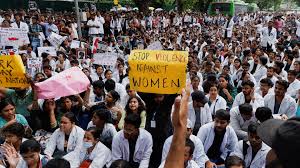Protests Intensify Across India Over Rape and Murder of Kolkata Doctor
Widespread protests and work stoppages continue across India as junior doctors and citizens demand justice for a 31-year-old postgraduate medical student who was brutally raped and murdered on August 9th in Kolkata. Although a major doctors’ association called off its strike early Sunday morning, many junior doctors remained off duty, and street demonstrations persisted, particularly in West Bengal.
In solidarity with the victim, thousands of people marched through the streets of Kolkata on Sunday evening, chanting “We want justice,” as authorities struggled to control the growing unrest. The protests, which have included candlelight vigils and nationwide refusals to treat non-emergency patients, underscore the ongoing issue of violence against women in India, despite the introduction of tougher laws following the infamous 2012 Delhi gang-rape.
The father of the victim, whose identity is protected under Indian law, expressed gratitude for the support, saying, “My daughter is gone, but millions of sons and daughters are now with me. This has given me a lot of strength, and I feel we will gain something out of it.”
The horrific crime occurred at the historic R.G. Kar Medical College and Hospital, a British colonial-era institution. The tragedy has reignited debates about the safety of women in India, with activists pointing out that despite legal reforms, incidents of violence remain alarmingly frequent.
A police volunteer, assigned to assist with hospital admissions for police personnel and their families, has been arrested and charged in connection with the crime. His mother expressed deep remorse, telling reporters, “I should not have given birth to my son… it’s a huge mistake.”
The Indian Medical Association (IMA) ended its 24-hour strike on Sunday but urged Prime Minister Narendra Modi to take immediate action to protect healthcare workers, especially since 60% of India’s doctors are women. The IMA has called for security measures similar to those at airports to be implemented in hospitals.
While most doctors have resumed their duties, unrest continues at R.G. Kar Hospital, where police banned gatherings of five or more people starting Sunday. However, protesters defied the ban before eventually dispersing.
The government has appealed to doctors to return to work to help combat rising cases of dengue and malaria, promising to establish a committee to recommend security improvements for medical professionals. Despite this, the All India Residents and Junior Doctors’ Joint Action Forum announced it would continue its “nationwide cease-work” for 72 hours, demanding a thorough investigation and swift arrests.
In Gujarat, Prime Minister Modi’s home state, over 6,000 trainee doctors remained on strike for a third day, while private hospitals resumed normal operations. The ongoing protests have placed significant pressure on healthcare services across the country, as hospitals struggle to maintain operations with reduced staff.
Dr. Prabhas Ranjan Tripathy, additional medical superintendent of the All India Institute of Medical Sciences in Bhubaneswar, confirmed that junior doctors and interns have not returned to work, adding, “There is a lot of pressure on others because manpower is reduced.”
As the protests continue to spread, the Indian government faces mounting pressure to address the systemic issues that allow such atrocities to persist.


